Are You An Intuitive or Sensing Personality Type? How to Find out!
In the personality community, there are a lot of myths and stereotypes related to both sensors and intuitives. Some people perceive intuitives as wrapped up in fruitless fantasies, and some intuitives perceive sensors to be dull or unimaginative. Let’s take a look at how you can REALLY tell if you’re a sensing or intuitive personality type.
Not sure what your personality type is? Take our new personality questionnaire here. Or you can take the official MBTI® here.
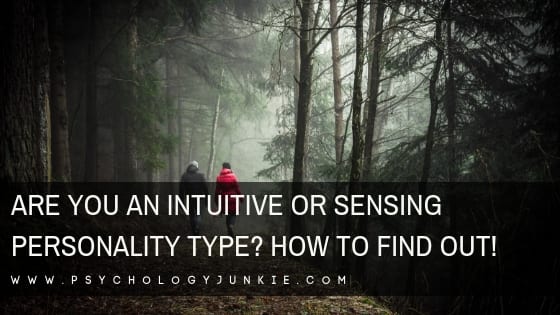
Are You an Intuitive or Sensing Personality Type? How to Find out!
To start, we need to understand that there are two different types of sensors and two different types of intuitives. We’ll try to narrow down which style of sensing or intuition you have by going through some questions.
Ask yourself these questions and be as honest in your responses as possible. Remember, at different times in your life you will relate to all of these statements. Your job is to pick the statement that comes naturally to you most of the time. Think about who you are without having to try to be that way.
Question #1 – Which Statement Most Accurately Describes You…
A) I’m always looking around for exciting adventures and opportunities that I can enjoy right now or soon. I love immersing myself in the details and experiences available to me. I love jumping into new opportunities and finding new ways to experience the world more fully. Sights, sounds, tastes, textures – all of these things capture my attention. I consider myself realistic, observant, and adaptable.
B) I love to “make memories” and create routines and experiences that I can revisit again and again. I notice when things change because I tend to compare what’s happening now with what has happened before. I like to create comfort for myself and others and enjoy a routine that gives me a feeling of comfort and familiarity. I consider myself practical and prepared – I like knowing what’s going to happen and being ready for it.
C) I see possibilities and ideas everywhere. In fact, I get so caught up in thinking about potential and ideas that I can forget what’s happening around me. I have impulsive energy to create, explore, innovate, and imagine. I love brainstorming with people, especially about theoretical avenues and hypothetical possibilities.
D) I am fascinated with the meaning behind things. I look for symbolic resonance in situations and shift perspective to see things from numerous conceptual angles. I enjoy complexity and sinking myself into theories and abstract trains of thought. I have an inner vision of the implications of things, so much that it’s hard for me to focus on anything but the future.
Question #2 – Which dimension of time do you enjoy being in the most?
A) I spend most of my time focused on what’s happening right now.
B) I spend most of my time analyzing what happened before and how it relates to right now and the future.
C) I spend most of my time wrapped up in future possibilities, but I feel like I jump around in time all over the place.
D) I spend most of my time thinking about the distant future.
Question #3 – What kind of communication do you prefer?
A) I like direct, realistic communication. Let’s talk about what we can experience, do, and enjoy. I like stories filled with action and excitement and humor is very important to me. I hate it when people take themselves too seriously or beat around the bush.
B) It’s important to me that the person I’m speaking to is making sense and staying on track. I like it when people speak in sequential order and back up what they are saying with facts and specifics. I enjoy sharing memories and experiences and discussing how we will get things done or specific plans we have. I hate it when people ramble or jump around in time while telling a story. I also tend to get bored in long theoretical conversations that have no practical application.
C) I love conversations that are a constant stream of ideas and perspectives. Sometimes as I’m talking I see connections between ideas and events that seem random to other people but are all connected to me. I love discussing philosophy, theory, hypotheticals, what COULD happen someday. I get bored when people speak in a very linear way. Start with the big picture and if we need more details we’ll fill those in later!
D) I like talking about theories and predictions – what’s most likely to happen in the future? What’s the underlying meaning and implication of current events? I love discussing philosophy or intriguing concepts. I don’t like it when people waste time discussing details or experiences that have no relevance for the future. Big-picture ideas and concepts are what interest me the most. The practical concerns of today tend to bore me.
Question #4 – How Aware of Details Are You?
A) I notice all the details around me without trying. It’s not that I fixate on all of them, I just naturally take them in.
B) I notice when things are out of order or different than they used to be. I’m a focused person so I’d say I’m relatively quick to notice details unless I’m lost in thought.
C) I notice details if they strike me as novel or symbolic in some way. I notice details that have potential. Then I’ll get caught up thinking of the potential and perhaps lose sight of the details.
D) I’m not particularly focused on details. I get caught up thinking about something’s meaning and can forget the physical details entirely. Focusing on concrete details stresses me out.
Question #5 – You go to see a movie. What do you want to discuss afterward?
A) Anything that seemed particularly funny or exciting. I might discuss how the activities in the movie made me think of experiences I’d like to have for myself. I might discuss how things looked or whether the movie was dull or interesting. I might recall the most vivid, humorous, relatable, or action-oriented scenes.
B) I talk about what happened in the movie, how I experienced it, and any similar situations that it evoked in my memory. If I watched a movie about a relationship I might recall how it made me think of my relationship. If I watched a movie about the military I might recall my own military experiences. I generally talk about what happened in the movie and my values and associations with it.
C) I talk about ideas that the movie gave me that are largely conceptual. What connections were there between the movie and what is happening now in society? What inspirational ideas did the movie give me? What concepts did the movie discuss and how could we extrapolate on those?
D) I talk about what the movie symbolized to me or what the underlying themes were. Did the movie give me any clues about the meaning of things or where things are going as a culture or society? Could I get into the perspectives of the characters I was watching? Did the movie inspire any questions or theories in my mind?
Okay, that’s all the questions for now!
If you mostly selected “A” statements, then you’re likely an SP personality type (ISTP, ISFP, ESTP or ESFP). You are realistic, adaptable, and probably adventurous. Check out more about your brand of sensing here.
If you selected mostly “B” statements, then you’re likely an SJ personality type (ISTJ, ISFJ, ESTJ, or ESFJ). You are down-to-earth, focused, and methodical. Check out more about your brand of sensing here.
If you selected mostly “C” statements, then you’re likely an NP personality type (INTP, INFP, ENTP, ENFP) You are visionary, innovative, and adaptable. Check out more about your brand of intuition here.
If you selected mostly “D” statements, then you’re likely an NJ personality type (INTJ, INFJ, ENTJ, ENFJ). You are future-oriented, insightful, and focused. Check out more about your brand of intuition here.
If you were torn between “A” and “B” statements, then you’re most likely a sensor. To find out what your entire personality type is, click here.
If you were torn between “C” and “D” statements, then you’re most likely intuitive. To find out what your entire personality type is, click here.
What intuition and sensing really tell us (and why you probably related to more than one option):
Intuition tells us that you look more at the background meaning and future potential of things. You’re more future-oriented than present-oriented and while you can be a little blind to the details you are usually quick to grasp potential and abstract connections.
Sensing tells us that you are more grounded in reality and the present and past. You easily see how things can be used and are more experience-oriented than idea-oriented. While you might forget to see the far-reaching implications of things, you are very aware of what’s needed right now and realistic concerns.
Remember, you use sensing and intuition. At different times in your life, you will probably have experienced all forms of sensing and intuition. As an intuitive, there will be times that you notice details vividly or long for hands-on experiences. As a sensor, there will be times when you’re aware of symbolism, underlying meanings, and far-reaching future implications. The question is, which of these preferences comes to you without trying most of the time? How do you see yourself processing information most naturally?
Find out more about your personality type in our eBook, Discovering You: Unlocking the Power of Personality Type.
Want to find out more? Check out these articles!
A Look at Each of the Myers-Briggs® Personality Types
Here’s What You Wish People Understood About You, Based On Your Personality Type
Here’s the Bad Habit You Need to Break, Based On Your Personality Type
Here’s How You See the World, Based On Your Personality Type
About Me:
My name is Susan Storm, and I’m an MBTI® practitioner and all-out psychology lover. I’ve been studying Jungian typology as well as developmental & childhood psychology for over ten years. Along with blogging about personality type, I love taking care of my 5 children and staying up late reading Kierkegaard. I’m an INFJ personality type. Follow me on Facebook, Twitter, or Pinterest to find out more about typology!




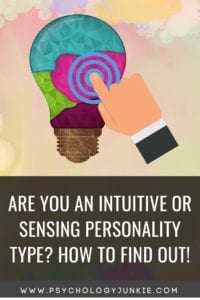
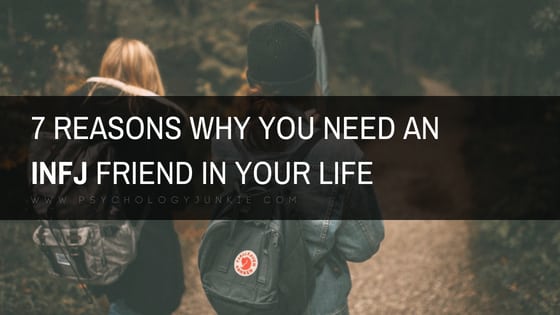


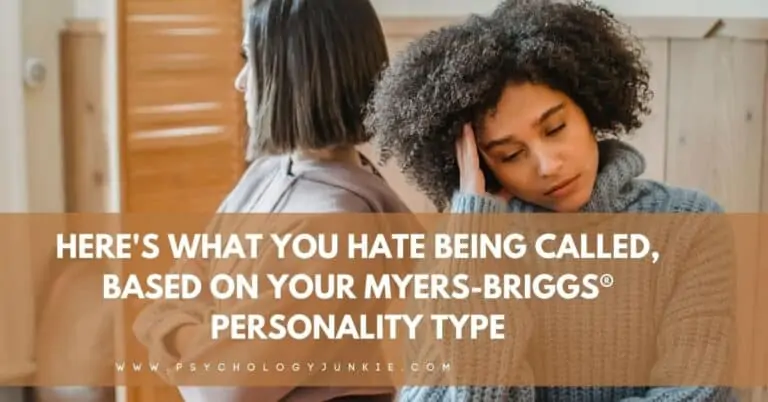
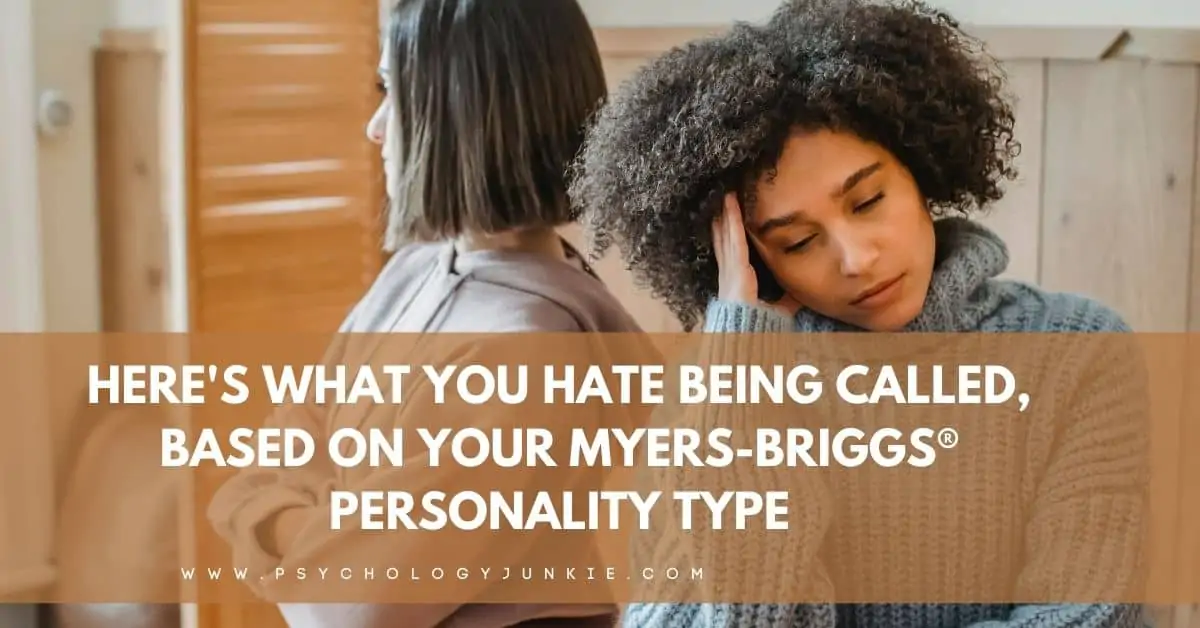



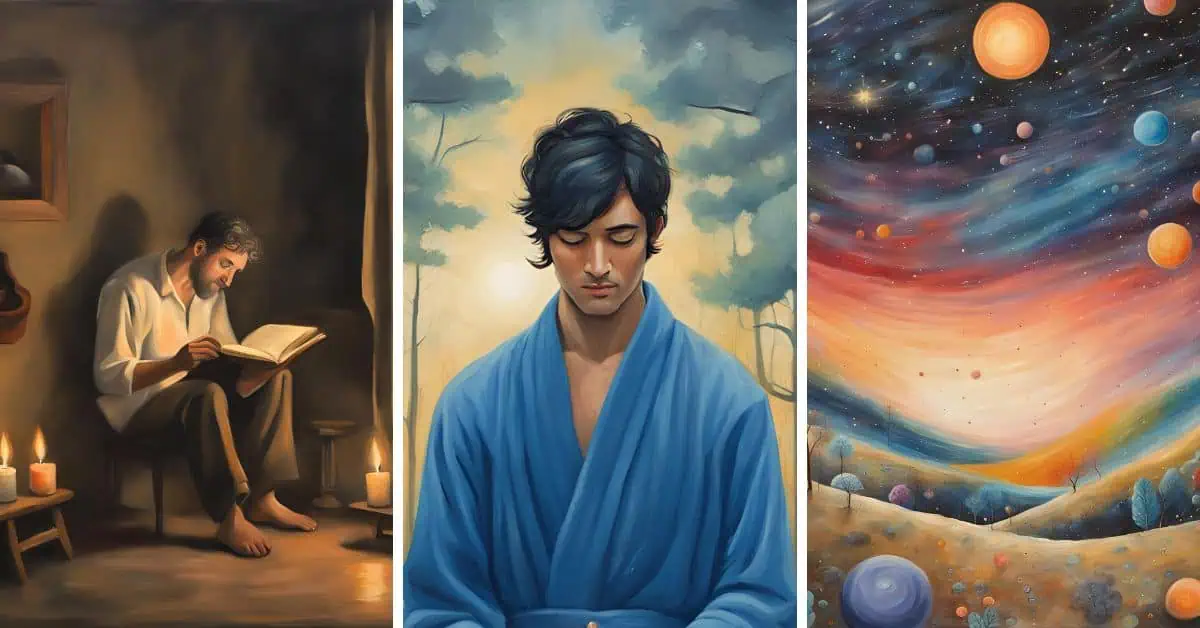
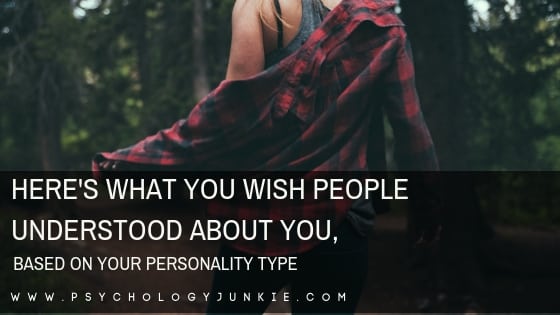
What if I got a mix of Bs and Ds?
Hi Cindy! This would mean that you are either an SJ or an NJ personality type. Both SJs and NJs are left-brain types and tend to be careful planners. Do you feel like one set of statements more accurately defines you throughout life? This article might also help: https://www.psychologyjunkie.com/2016/12/15/si-user-ni-user-difference-introverted-sensing-introverted-intuition/
The most pleasant thing I can live is undeniably the fusion of the present and future. An incomparable feeling of eternity. The ultime sensation.
But I have nothing against the remomeration of these past sensations…
Thank You for this article. I think it solves my dilemma whether I am intuitive or sensor. As you written we use both intuition and sensing. The difference is what we prefer and feel more comfortable with. I got three C and two D answers and I see that I really prefer intuition but sometimes I am forced to use sensing even if it is not that enjoyable for me. Now I got another dilemma. INFJ or INFP. I think I prefer Ne over Ni but on the other hand I relate to Fe more than Fi. I was also thinking about ISFJ but after reading this article and the one about type of intelligence I don’t see myself as SJ.